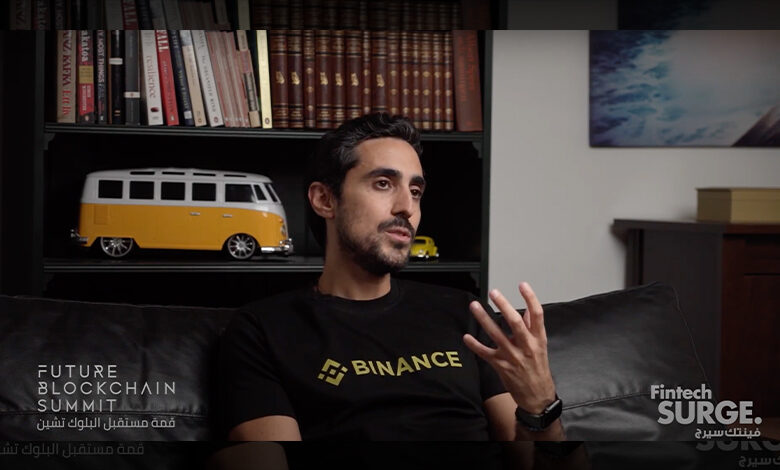Exclusive Interview: Cryptocurrencies Are Here to Stay, Says Binance Regional Director

Cryptocurrencies are here to stay, according to Bader Kalooti, Regional Director of Growth and Operations at Binance.
In an era defined by innovation and digital transformation, Kalooti underscores the enduring relevance of cryptocurrencies, emphasizing how Web3 and blockchain technologies have emerged as dynamic forces driving efficiency, optimizing value transfer, and ushering in an era of heightened trust, transparency, and immutability across various industries, extending far beyond the confines of traditional finance.
“Web3 and blockchain have proven a powerful solution to drive efficiency, transfer value more effectively, and add a layer of trust, transparency, and immutability to any sector, not just finance.”
Binance in MENA: A Hyper-Local Strategy for Diverse Markets
Binance covers 20 markets across MENA specifically, which Kalooti describes as a very diverse and fragmented region. “If you really want to unlock its potential, you have to stitch it together very carefully.”
He said Binance’s strategy, bolstered by a big playbook, was to take a ‘hyper local’ approach to the market as opposed to ‘one size fits all’. “We are able to cater to the nuances of the region and resonate with our audience.”
Beyond Crypto Exchange
Kalooti added that Binance strives to put the user at the center of everything it does. It translates into ensuring all funds are safe on the platform and that customer feedback is constantly factored in to deliver a top-notch service.
“It is also important that we are able to leverage the breadth of the finance product offering,” added Kalooti. While Binance is sometimes perceived as being only a cryptocurrecy exchange, it is essentially a Web3 ecosystem. “That is particularly important in a bear market where sometimes users are more averse to trading. We now have other ways we can engage with our customer base besides just buying and selling cryptocurrencies.”
Contributing to the fact that today it is the largest exchange of its kind in the world is that Binance remains highly engaged with the fintech community. “It is important for us to earn trust. In fact, that grassroots approach was part of our DNA since day one.” Kalooti revealed this approach has translated into 20X growth for Binance in the MENA region since 2020.
“It has been very exciting to be part of that story and bring Web3 into MENA. And it is not just an element of ‘copy and paste’ anymore. It is a new paradigm whereby we are actually innovating a new technological trend from this region,” said Kalooti. Focusing on localization, he added compliance with local regulations has been key from the outset.
Targeted Marketing and Strategic Partnerships
Dubai and Bahrain were among the first to establish local cryptocurrency exchanges. “This is again pioneering the industry as it introduces a regulated framework as opposed to the previous ways it has been done. And this is the future of the industry,” said Kalooti. All Binance’s product and service offering is available in Arabic, together with 24/7 customer support.
“We also ensure all our marketing campaigns are localized. We want to cater to the specific demographics of the region, which is not a homogeneous setup like the United States, for example, where the cultural values are very much in line and the way you speak to users is very similar.”
Kalooti said that MENA, on the other hand, comprises 20 countries and different ethnicities, with 190 nationalities represented in Dubai alone. “You have to be dynamic and tactical with your marketing campaigns. We also localize our strategic partnerships with banks, merchants, and payment processors. This is just to add that extra level of convenience and familiarity to our user base.”
The Role of Education in Mass Adoption
A challenge in the cryptocurrency and Web3 space remains a lack of awareness and knowledge, which translates into skepticism and uncertainty on the part of many potential users. “With the emergence of any new technology, there is a tendency for it to be quite esoteric, meaning that a very small percentage of the population will relate to that new technology. Therefore, education plays an instrumental role to drive mass adoption,” said Kalooti.
In this regard, Binance Academy is a freely accessible online library of hundreds of articles about Web3 and blockchain translated into 20-plus languages. Binance also partners with universities to conduct online or in-person workshops.
“There is a high degree of affinity between college students and cryptocurrency because they realize that future job creation opportunities will come from within that space,” noted Kalooti. It hosts ‘Ask Me Anything’ (AMA) sessions to address hot-button topics and latest trends. “We find a lot of engagement.”
Binance also recently launched a curated crash course called ‘Blockchain for Everyone’, translated into Arabic, that presents the fundamentals of Web3 in an easily digestible manner. Attendees who complete the course are presented with an NFT certificate.
Dubai’s Emergence as a Crypto Hub
Kalooti stressed it is important to distinguish between novice versus expert cryptocurrency users. Catering to both ends of the spectrum, Binance Light allows new users to be onboarded and navigate the product offering, while Binance Pro is a feature-rich platform catering for more sophisticated investors.
Looking at Dubai in particular and what has established it as the global ‘crypto hub’, Kalooti points to the global liquidity cycle as an important short-term driver. “That is highly volatile,” he acknowledged. However, over the long term, it is driven by network adoption and regulations. An entrepreneur will come up with a new idea but have to establish a product market fit in an ambiguous environment where the rules are unclear, a typical ‘Wild West’ scenario. After a certain level of scale, the regulator steps in to play catch up and establish the rules of the game.
“This is what is happening right now,” affirmed Kalooti. Thus, Binance is currently the largest exchange in the world with 18 licenses. “This is very important because proper regulations pave the way for mass adoption and open the door for institutional capital.” An example was BlackRock’s filing of its spot Bitcoin ETF, which Kalooti cites as a ‘massive’ milestone.
“You have the largest asset manager in the world essentially stamping credibility onto the entire Web3 ecosystem. Recently we have also had a lot of court rulings in favor of cryptocurrency and Web3. It indicates that there is light at the end of the tunnel and hopefully that good things are coming,” said Kalooti.
The Path to Mass Adoption
In terms of the wider adoption of cryptocurrencies, Kalooti called for a greater variety of use cases to present to, and convince, potential users. Bitcoin got the ball rolling with “a new store of value, call it digital gold.” Ethereum paved the way further for DeFi and NFTs. “Today there is a range of interesting use cases,” said Kalooti. For example, there is now the potential to tokenize real world assets, a decentralized model is being applied to cloud storage with a host of emerging trends.
Far from replacing Web2, Kalooti emphasized that Web3 wields the benefits of blockchain to improve efficiency and productivity. “That is an area where we see a lot of opportunity for use cases. It is important to understand that young talent is flocking towards the space. And there is a lot of capital flowing back to those entrepreneurs. Eventually you will get those killer apps that come on chain and bring a wave of a billion plus users, very similar to what Instagram, Facebook, and YouTube did for Web2 in the mid-2000s.”
Patience in the Face of Challenges, A Promising Future for Crypto
Kalooti referred to the famous Gandhi rallying cry of ‘Ignore; Laugh; Fight’. “I personally think we are at the fighting stage. We have seen this before where numerous companies with disruptive technologies had to go up against regulations, governments, and established unions, such as Uber with ride hailing and Amazon with e-commerce. This is where we are with cryptocurrencies today. You have to be patient.”
Cryptocurrency adoption is currently at the same developmental phase as the internet was in 1999. The total market capitalization of the cryptocurrency industry is around US$1 trillion, a third of the market capitalisation of Apple alone.
“We are relatively still quite early in the journey. Just sit back and relax. I know it has been a turbulent ride. Fasten your seat belts because we will ultimately arrive at our intended destination,” concluded Kalooti.
Kalooti was a guest on the MENA Surge Podcast hosted by Steven Besse on September 23. The podcast is powered by FinTech Surge and Future Blockchain Summit taking place at Dubai Harbor from October 15 to 18, alongside Expand North Star and in association with GiTex Global.





